Related Research Articles
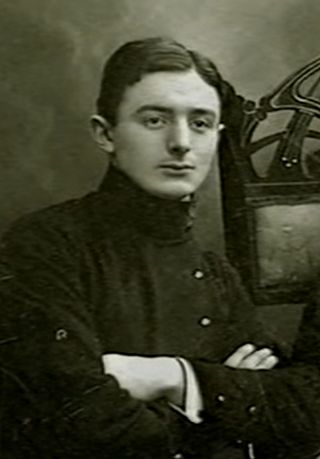
Dziga Vertov was a Soviet pioneer documentary film and newsreel director, as well as a cinema theorist. His filming practices and theories influenced the cinéma vérité style of documentary movie-making and the Dziga Vertov Group, a radical film-making cooperative which was active from 1968 to 1972. He was a member of the Kinoks collective, with Elizaveta Svilova and Mikhail Kaufman.

The October Revolution, known in Soviet historiography as the Great October Socialist Revolution, and in the anti-Soviet historiography as the October Coup was a revolution in Russia led by the Bolshevik Party of Vladimir Lenin that was a key moment in the larger Russian Revolution of 1917–1923. It was the second revolutionary change of government in Russia in 1917. It took place through an armed insurrection in Petrograd on 7 November 1917 [O.S. 25 October]. It was the precipitating event of the Russian Civil War.
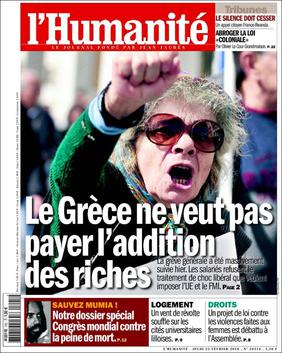
L'Humanité is a French daily newspaper. It was previously an organ of the SFIO, de facto, and thereafter of the French Communist Party (PCF), and maintains links to the party. Its slogan is "In an ideal world, L'Humanité would not exist."
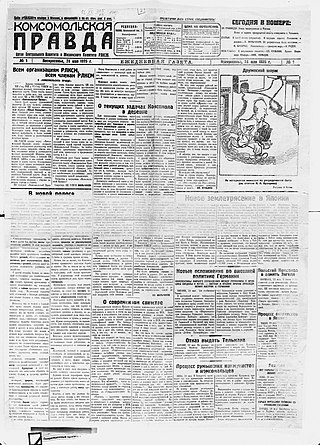
Komsomolskaya Pravda is a daily Russian tabloid newspaper that was founded in 1925.

Izvestia is a daily broadsheet newspaper in Russia. Founded in February 1917, Izvestia, which covered foreign relations, was the organ of the Supreme Soviet of the Soviet Union, disseminating official state propaganda. It is now described as a "national newspaper" of Russia.
Sovetskaya Rossiya is a political newspaper in Russia. It kept its name after the dissolution of the Soviet Union in December 1991 and presently presents itself as a leftist independent newspaper. Its current editor is MP Valentin Chikin.

Kommersant is a nationally distributed daily newspaper published in Russia mostly devoted to politics and business. The TNS Media and NRS Russia certified July 2013 circulation of the daily was 120,000–130,000. It is owned by Alisher Usmanov.
Literaturnaya Gazeta is a weekly cultural and political newspaper published in Russia and the Soviet Union. It was published for two periods in the 19th century, and was revived in 1929.
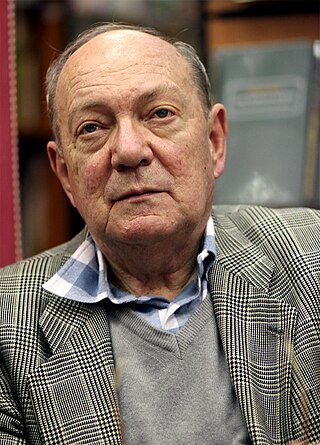
Anatoly Tikhonovich Gladilin was a Soviet and Russian writer and poet who defected from the Soviet Union in 1976 and subsequently lived in Paris.

Printed media in the Soviet Union, i.e., newspapers, magazines and journals, were under strict control of the CPSU and the Soviet state. The desire to disseminate propaganda was believed to had been the driving force behind the creation of the early Soviet newspapers. Newspapers were the essential means of communicating with the public, which meant that they were the most powerful way available to spread propaganda and capture the hearts of the population. Additionally, within the Soviet Union the press evolved into the messenger for the orders from the CPSU Central Committee to the party officials and activists. Due to this important role, the Soviet papers were both prestigious in the society and an effective means to control the masses; however, manipulation initially was not the only purpose of the Soviet Press.

The St Nedelya Church assault was a terrorist attack on St Nedelya Church in Sofia, Bulgaria. It was carried out on 16 April 1925, when a group of the Military Organisation of the Bulgarian Communist Party directed and supplied by the Soviet Military Intelligence blew up the church's roof during the funeral service of General Konstantin Georgiev, who had been killed in a previous communist assault on 14 April. 150 people, mainly from the country's political and military elite, were killed in the attack and around 500 bystander believers, who attended the liturgy, were injured.

Yevgenia Markovna Albats is a Russian investigative journalist, political scientist, writer and radio host.
Eesti Ekspress is an Estonian weekly newspaper.

Vitaly Portnikov is a Ukrainian editor and journalist.
Kultura, known as Sovetskaya Kultura during the Soviet times, is a Russian newspaper, based in Moscow. The newspaper was previously published twice weekly but is currently a weekly newspaper. Today the newspaper circulates 29,200 copies a week, in all federal subjects of Russia.
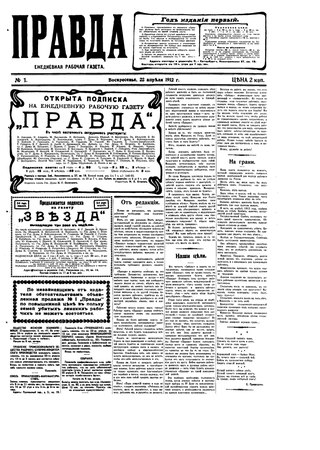
Pravda is a Russian broadsheet newspaper, and was the official newspaper of the Communist Party of the Soviet Union, when it was one of the most influential papers in the country with a circulation of 11 million. The newspaper began publication on 5 May 1912 in the Russian Empire, but was already extant abroad in January 1911. It emerged as the leading government newspaper of the Soviet Union after the October Revolution. The newspaper was an organ of the Central Committee of the CPSU between 1912 and 1991.

Oleh Ihorovych Makhnitskyi is a Ukrainian politician and lawyer. MP of Ukraine 7th Convocation, as a member of "Svoboda".
Tiesa was the official daily newspaper in the Lithuanian SSR. Established in 1917, the newspaper soon became the official voice of the Communist Party of Lithuania. After the Lithuanian victory in the Lithuanian–Soviet War, the party and the newspaper were outlawed in Lithuania. Thereafter, it was first printed in exile and later illegally in Kaunas. Tiesa survived irregular publishing schedules, frequent relocations, staff changes, and other difficulties and, after the Soviet occupation of Lithuania in June 1940, became the official daily of the new communist regime. At its peak, its circulation exceeded 300,000 copies. After the collapse of the Soviet Union, Tiesa lost its official status and its circulation shrunk. The publication was discontinued in 1994.
The history of Russian journalism covers writing for newspapers, magazines, and electronic media since the 18th century. The main themes are low levels of literacy, censorship and government control, and the emphasis on politics and political propaganda in the media.
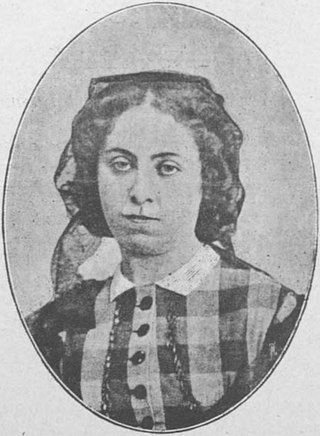
Evgenia Ivanovna Konradi was a Russian writer, journalist, and translator. She was first an editor, then owner of the newspaper Nedelya (Week), in which she published articles on society in foreign countries.
References
- ↑ Lenin: 1894/friends: Let us now pass to the political programme of
- ↑ Schmemann, Serge (31 July 1983). "Soviet says Hare Krishna cloaks hide C.I.A. Daggers". The New York Times. Retrieved 6 July 2022.
- ↑ Henry W. Morton (December 1965). "Book review". International Journal. 20 (4): 561. doi:10.1177/002070206502000432.